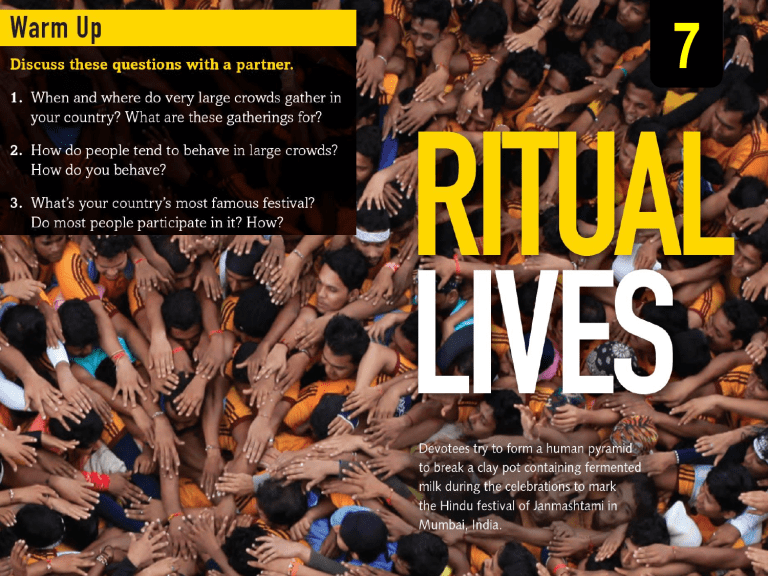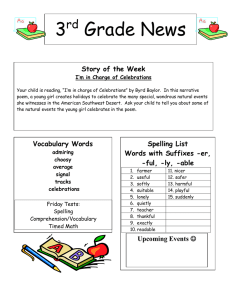
7 Before You Read A. Completion. Look at the photo and read the caption. Then complete the sentences below using the words in bold. 1. When a large group of people or animals run together in a wild and uncontrolled way to escape from something, it is called stampede a(n) _______________. 2. _______________ are people who make a journey to a holy Pilgrims place for religious reasons. 3. If you _______________ in a sea, river, or lake, you swim, bathe play, or wash yourself in it. 4. A(n) _______________ place has too many things or people overcrowded in it. U7A-p.116 B. Scan. Quickly scan the reading on pages 117–118 to match each person with a description (a–c). Then read the whole passage. b 1. Rahul Mehrotra a. a psychologist from the University of St. Andrews a 2. Stephen Reicher b. a professor of urban design and planning c 3. Nick Hopkins c. a psychologist from the University of Dundee U7A-p.116 U7A-p.117 Reading Comprehension Multiple Choice. Choose the best answer for each question. Purpose Detail Paraphrase 1. What is the purpose of the first two paragraphs? a. to explain why Hindus are religious b. to describe a typical day in Allahabad, India c. to describe the calm atmosphere of a religious gathering d. to explain how people travel to a major festival 2. Which of these statements does NOT describe the Kumbh Mela? a. the most sacred of all the Hindu pilgrimages b. the largest peaceful gathering of people in the world c. a festival that involves people bathing together in a river d. an event that happens only once every 12 years 3. What’s another way of saying crowds are critical to society (lines 58–59)? a. It’s good for crowds to criticize societies. b. Society determines the safety of crowds. c. Crowds are an important part of society. d. Crowds can be a disadvantage in any society. U7A-p.120 Vocabulary Detail Cause and Effect Cause and Effect 4. What does What’s more mean in line 78? a. In addition b. Likewise c. To illustrate d. In any event 5. Why did Stephen Reicher and his colleagues attend the Kumbh Mela? a. to test their theory that crowds are beneficial to society b. in the hopes of gaining a sense of peace and harmony c. to see how long their own positive mental attitude would last d. to confirm their idea that people in the countryside live happier lives 6. According to Nick Hopkins, how does “shared identity” affect human relationships? a. It turns cooperation into competition. b. Individuals in a crowd no longer think about the crowd. c. People become much more religious than they were before. d. People achieve more together than they could alone 7. What does Reicher think might be the reason there was a stampede? a. There weren’t enough seats on the train. b. The people didn’t form a psychological crowd. c. There were too many people on the train. d. Some pilgrims couldn’t get into the Kumbh Mela. U7A-p.120 A. Scan. Scan the first two paragraphs of the reading on page 117. Find the bold words below and underline them. 1. 2. 3. 4. 5. 6. 7. 8. 9. line line line line line line line line line 7 8 10 11 13 16 18 19 20 U7A-p.121 B. Multiple Choice. Use the context in the reading to decide the word or phrase that is closest in meaning to each word. b 1. united a. working separately b. together as one c. unafraid of others a 2. panic a. extreme fear b. extreme tiredness c. extreme calmness b 3. cooperate a. talk a lot b. work together c. stay away from others b 4. joyful a. very clean b. very happy c. very helpful a 5. wading a. walking through water b. drinking water c. removing water U7A-p.121 c 6. splash a. shout loudly b. drink happily c. cause water to move messily c 7. drag a. move quietly b. push easily c. pull with difficulty c 8. holy a. angry b. ordinary c. religious b 9. robes a. short, dark hair b. long, loose clothing c. large, colorful flowers U7A-p.121 Vocabulary Practice A. Completion. Complete the information using the correct form of words from the box. Two words are extra. faith prospective harmony ritual organized suspect More and more, people are flocking to religious sites on and off the beaten path. Religious tourism, also known as faith 1. “ ____________ tourism,” is a fast-growing industry that produces an estimated 18 billion dollars in revenue a year. People go on faithbased trips for a variety of reasons, whether as individuals, small groups, or larger 2. ____________ organized tours. Some go on pilgrimages. Others go as leisure travelers to view the customs and rituals of a faith and culture that aren’t their own. Some of the most famous sacred places to visit include the 3. ____________ cities of Mecca, Jerusalem, Varanasi, and Karbala. Other popular sites include Fatima, Portugal; Shikoku, Japan; and Lourdes, France. U7A-p.122 Countries that receive large numbers of faith tourists expect the numbers will continue to rise. In India and Saudi Arabia, for example, hotel chains are building for the expected increase in visitors. North American tour companies now directly target prospective religious travelers. Rising 4. ____________ incomes, lower travel costs, and a desire to find journeys with a purpose are fueling an increase across different faiths—both in traditional sites and lesser known spots. ˄ The Basilica of Fatima is an important pilgrimage site in Portugal. U7A-p.122 B. Words in Context. Complete each sentence with the correct answer. b 1. When a group of people progress, they _____. a. stop completely b. move forward a 2. If someone’s intentions are evident, they are _____. a. clear b. unknown a 3. Society refers to _____ who share common laws, traditions and values. a. a community b. a tribe b 4. If you’re trying to dissuade someone, you’re trying to convince the person _____ something. a. to do b. not to do a 5. Things that are in harmony _____ with one another. a. go well b. don’t go well b 6. If you suspect something, you _____ it is probably true. a. don’t believe b. believe Word Link The word root gress means “to step,” or “to move from one level to another,” e.g., progress, digress, transgress, regress, aggressive. U7A-p.122 7B ˄ Reza’s photograph of Muslim pilgrims surrounding the Ka’aba in the Al-Haram mosque in Mecca, Saudi Arabia U7B-p.123 Before You Read A. Scanning. Scan the text and photos on pages 123–127 and match the photographers (1–5) to the image descriptions (a–e). d 1. _____ Reza a. music festival to raise funds e 2. _____ Joel Sartore b. a traditional dance ritual b 3. _____ Chris Johns c. people in fancy costumes and masks c 4. _____ Sam Abell d. a religious pilgrimage a 5. _____ Jason Edwards e. carnival rides and booths U7B-p.123 Reading Comprehension Multiple Choice. Choose the best answer for each question. Purpose Fact or Theory 1. What is the purpose of the first sentence in the first paragraph? a. to show that Thomas Alva Edison was right b. to illustrate how we continue to be inspired to celebrate c. to emphasize that a great deal of preparation goes into celebrations d. to imply that even with the best preparations, we don’t know how to truly celebrate 2. Which of these statements about parades is a theory, but not a fact? a. The earliest parades were hunter-gatherers returning from a successful hunt. b. There are records of religious parades dating back to 3000 B.C. c. Parades became more regular and formal as civilizations developed. d. Parades have become an important way to make money for people around the world. U7B-p.128 Detail Main Idea Inference 3. Why did Venice’s Carnival nearly disappear for a hundred years? a. The Venetian Republic was conquered. b. It became too commercial for the people of Venice. c. The Senate didn’t approve of the partying that was taking place. d. The religious period on which the festival was founded was no longer practiced. 4. What is the main idea of paragraph 9 (starting line 82)? a. Three million people make the Hajj each year. b. The most important type of celebration is the religious celebration. c. Religious celebrations take place year-round and can be found all over the world. d. It is important for Muslims to try and make the Hajj as part of their religion. 5. Which of these would describe a flash mob? a. Four strangers meet at a concert and then decide to perform together in a public square. b. Someone announces on social media a series of performances at their school. c. An online group secretly plans and performs a dance in a crowded train station. d. The number of people watching a street performer grows to several hundred. U7B-p.128 Inference Detail 6. Which of these statements would the author probably agree with? a. We will soon learn who, where, and why humans first began to celebrate. b. Celebrations are as important to humans as food, shelter, love, and freedom. c. Celebrations, though important, are often not worth the time and money. d. Modern celebrations are now just for fun, and sadly lack any social impact. 7. Which photographer’s photo shows a modern, socially conscious gathering? a. Joel Sartore b. Chris Johns c. Sam Abell d. Jason Edwards U7B-p.128 A. Classification. Work with a partner. Look at the words from the reading below. Write them in the correct column. disappear inhabitant people spiritual ensure Internet popularity undeniable harvest joyful prehistoric unknowable holiday music religious unknown disappear, ensure, only: spiritual, inhabitant, Internet, popularity, joyful, undeniable, unknown prehistoric, religious unknowable people, harvest, holiday, music U7B-p.129 B. Matching. Look at these words that share a common word root. Underline the roots and match them to their meanings. c century 1. _____ e 2. _____ bicycle centimeter cents a. carry cyclone cycle b. new g 3. _____ terminal terminate b 4. _____ novice renovate f 5. _____ microphone telephone a 6. _____ export portable determine c. hundred novelty d. write phonetics e. circle porter f. sound d 7. _____ inscribe scribble g. end describe U7B-p.129 Vocabulary Practice A. Completion. Use the correct words to complete the information below. Every fall, the 1. (inhabitants / shelters) of Santa Fe, New Mexico, build Zozobra, a 15-meter (50foot) ghostlike cloth and wooden puppet. Anyone with anxiety, worry, or sadness can write down their thoughts on pieces of paper and leave them in a box. These will be left at the feet of Zozobra, to be burned along with the puppet. The Zozobra festival started in 1924 when local artist William Shuster came up with the idea. His puppet was inspired by the Holy Week celebrations of the Yaqui Indians in Mexico, who burned paper figures to rid their community of evil. Shuster came up with the name Zozobra, which means “anxiety” or “gloom” in Spanish. ˄ The burning of Old Man Gloom, also known as Zozobra, in Santa Fe, New Mexico, U.S.A. U7B-p.130 Before Zozobra is lit on fire, people dance at his feet and his “death sentence” is 2. (solemnly / strikingly) given. As he burns, firecrackers inside him explode. It is said that with him go all the anxiety and worries people had from the past year. It is 3. (logically / undeniably) a very 4. (striking / glimpsing) image— seeing Zozobra burn against the dark desert sky. For some, the celebration is 5. (sheltering / spiritual). For others, it’s a chance to socialize. For many, it’s simply for fun. In any event, the celebration has become more 6. (commercial / harvested) in recent years. More than 50,000 buy tickets to attend every year. U7B-p.130 B. Words in Context. Complete each sentence with the correct answer. b 1. If you glimpse something, you _____ it for a very short time. a. hear b. see b 2. Someone would probably want to find shelter if _____. a. it were a beautiful day b. it were raining hard b 3. The harvest is the time of year when crops are _____. a. planted b. gathered a 4. If someone uses logic in their argument, they are being _____. a. reasonable b. unreasonable a 5. If something is undeniable, it is _____. a. certain b. uncertain Thesaurus striking Also look up: (adj.) impressive, distinct, stunning, eye-catching, breathtaking U7B-p.130 Before You Watch A. Matching. Here are some words you will hear in the video. Match the words with their definitions. 1. _____ d adorn a. an arrangement of objects meant to decorate or advertise 2. _____ e commemorate b. a type of flower that grows on the surface of water 3. _____ display a c. a ring that is made of flowers or leaves 4. _____ garland c d. to make something attractive by adding something beautiful 5. _____ b lotus e. to do something in order to remember an important event U7B-p.131 While You Watch A. Noticing. Check (✓) the things that people do to celebrate Diwali, according to the video. □ ✓ create garlands of flowers □ visit temples with their families ✓ □ bathe in the river □ pick lotus flowers from their gardens □ create pictures made of sand ✓ □ share food with neighbors ✓ □ ✓ dress up in nice outfits □ watch parades □ go shopping ✓ □ watch fireworks U7B-p.131 B. Correction. The captions below are not accurate. Use the information in the video to correct each caption. 1. Diwali has sometimes been compared to the holiday of New Year’s Eve. New Year’s Eve Christmas _____________________ _____________________ 2. Diwali commemorates the forces of good over the forces of darkness. good light _____________________ _____________________ U7B-p.132 3. Garlands of flowers are made to adorn people’s bodies. people’s bodies people’s _____________________ homes _____________________ 4. The lotus flower that people create on their doorways is a symbol of happiness. happiness welcome _____________________ _____________________ U7B-p.132


